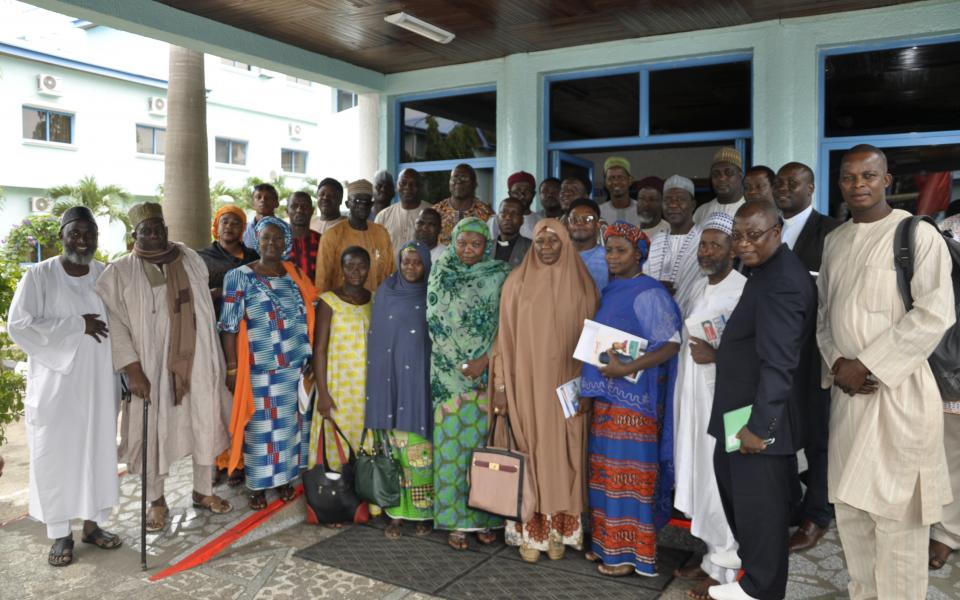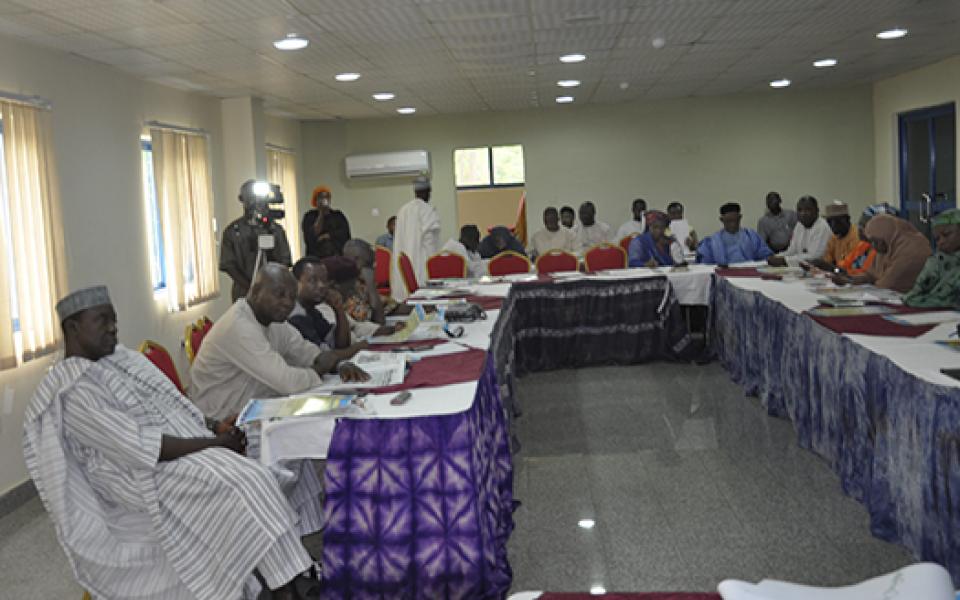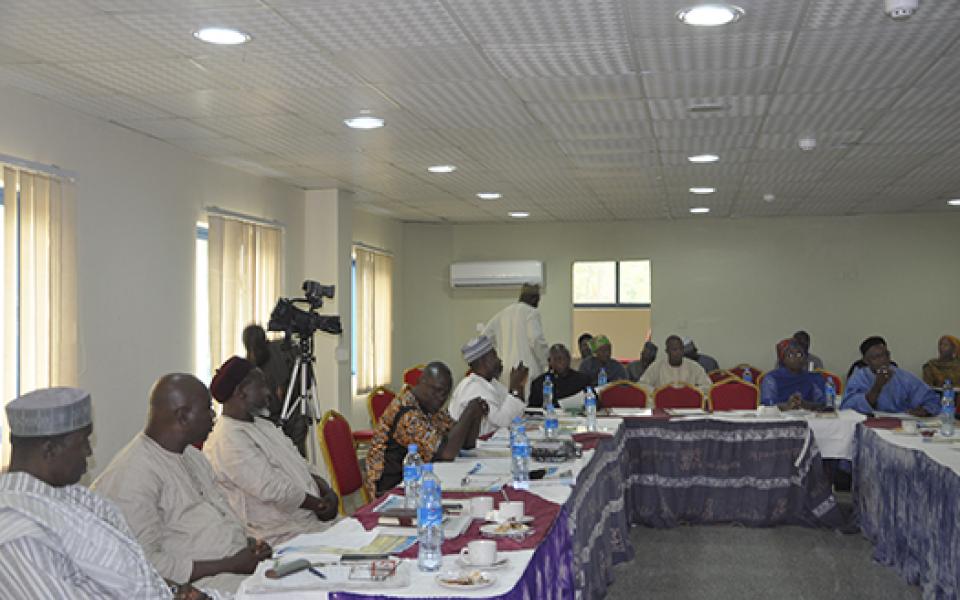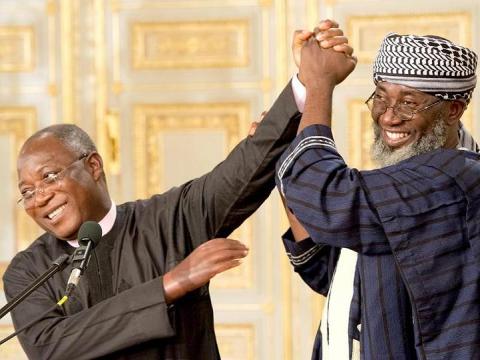
Report on the Meeting for Kaduna Peace Committee of Religious Leaders
Held at: ASAA Pyramid Hotel, Kaduna
Date: 14th May, 2015
Organized by: Interfaith Mediation Centre Kaduna
Supported by: CAID and Islamic Relief UK
OPENING PRAYER:
The opening prayer was coordinated by Pastor Dr. James Movel Wuye, which was observed by the participants for the meeting using the interfaith model of prayer. After the opening prayer, an introduction of participants was coordinated by Rev. Bitrus Dangiwa. As part of the introduction, participants and facilitators gave the following responses on the significance of peace to each person:
- Response of the significance of peace in Kaduna state.
- Peace is very important for us, the people of Kaduna state.
- Peace is what brought us here, and that is what we need as people of faith.
- Peace is important because if there is no peace, there won't be any development, and the holy scripture confirms that Jesus Christ is the prince of peace.
- Peace is divine.
- Peace is what we cherish and pray that Kaduna will be peaceful and Nigeria as a whole.
- Peace is what we all need in our daily lives.
- Peace is what we all need.
- Peace is tantamount to development.
- Blessed are the peace makers, as the bible records.
- The holy bible preaches peace.
- Signing of the Kaduna peace declaration is a milestone that promotes and has sustained the peace in Kaduna.
- Peace is very important and we very much need to preach and promote peace.
- Peace is related to development and it is our duty to take the message of peace to the grassroots.
- Continue with the initiative that promotes peace.
- Other places have used the peace document to foster peace among its people.
- Peace is everything.
- Peace is important to all people.
- Peace is key to development.
- Peace is the bedrock of development.
- Peace is important to us all.
- Without peace there will be no nation.
- Peace is ultimate.
A moment of silence was observed to remember the passing away of three (3) members of the Kaduna Peace Committee of blessed memory that have passed away, among them namely: Habu Baba Mari, Rev. Y. Bako Sidi and Arch. Bishop B. A. Achigili. Prayers were offered for God to grant them eternal rest, because they were part of this historic movement during the signing of the Kaduna Peace Declaration Document of Religious Leaders in Kaduna, in August 22nd 2002 and the great role they have played along with the remaining members in ensuring that the State is peaceful.
A communication agreement was presented by Pastor Dr. James Movel Wuye, who states that for the target audience of this caliber, we need to observe some certain regulations that will guide the process of this meeting, such as: put phones on silent, minimize side talk, respect the views of others, and listen with resilience. The facilitator informed the gathering that the meeting will be an interactive one, and hence he requested that we all share the best information we have in order to make sure that at the end of this meeting, we would have achieved the purpose of this meeting.
ATTENDANCE:
The program had about 36 participants: 28 men and 8 women.
OVERVIEW OF THE KADUNA PEACE DECLARATION:
Pastor Dr. James Movel Wuye said that the group worked on the Kaduna Peace Declaration document for about six (6) months, and several meetings were held in Lokoja, Kogi, Kano and in Kaduna State. After a series of meeting and editing and putting in all work required to make the document an acceptable one, (which also is to reflect a people-oriented one so that during the presentation it will serve its purpose for the people of Kaduna State in ending the violence and bloodshed, and also to enhance and promote peaceful coexistence in the State), he further reiterated that the process was a male-dominated one during the signing in 22nd August 2002, as this was due to the nature of the situation in the State then. He stated that the documents were fashioned after the First Alexandria Declaration of the Religious Leaders of the Holy Land Alexandria, January 21, 2002 in Egypt.
After the signing of the Kaduna peace declaration document, the State faced a herculean task, because nine (9) month after the signing, on 21st November 2002, conflict erupted after the signing of the prestigious Kaduna Peace Declaration, which was a bloodier consequence to the Miss World event in 2002 in Abuja, Nigeria. The Muslims protested against the Miss World beauty pageant, which was to be hosted by the country. In 2001, a Nigerian, Agbani Darego, won the title and Nigerian organizers seized the chance to host the event in Abuja in 2002. Immediately the bid was won, protests broke out. Muslims called it a spectacle of indecency and were particularly exasperated by the fact that the contest date fell within the lunar month of Ramadan, Muslim’s holiest month. The organizers tried to stave off the protests by postponing the contest for a month. But it followed an article in ThisDay newspaper, which was considered to have slighted Prophet Mohammed, which was the main reason that fueled the conflict. The conflict broke out in the city of Kaduna and also spread to our nation’s capital, which reported that over 200 people died and millions of damages in destroyed property occured, and many people were displaced from their homes. This time around, the death toll was less in number compared with what happened in the case of the 2000 shariah crises, which recorded about 2000 persons dead and property in millions destroyed.
The Kaduna peace committee suffered some setbacks due to lack of continuous funding, but there was co-funding of its activities with support from Coventry Cathedral, OTI, State government and IMC. These were the ones that managed the group for a certain period of time, and together, the group intervened in many instances and initiated many other activities to promote peace within the State. But the main support was from Office of Transition Initiatives (OTI), Nigeria, who supported it during the various phases of the workshops and action plan meetings.
The document outlived government, because it is a working document and people-oriented. International dignitaries, both within Nigeria and outside, were present during the signing of the document. The peace in Kaduna was enjoyed for about nine (9) years, before the next conflict. It is now time for us to work with the new government and among the religious groups working in the restoration of peace in Kaduna state.
Pastor James then read through the peace document and was precise on the 7th item where it recommends that, “We announce the establishment of a permanent joint committee to implement the recommendations of this declaration and encourage dialogue between the two faiths, for we believe that dialogue will results to the restoration of the image of each in the eyes of the other.” Which, he said, is on this basis that we come to this meeting to reflect on it; and to see what we have done right and where we have gone wrong and what we need to put our hands together to move forward.
REFLECTIONS:
During the discussion some important points were enumerated by the participants, because of the nature of the interaction, which was captured below as follows:
- Lack of women religious leaders involvement in the KPC committee.
- The committee has not been active for the past years.
- The committee were absent during, one of the conflict assessment after some conflict in the State, during one of the State Military administration, but there was a response from JNI secretary that clarified that then the committee was not yet in existence.
- It was noted that some items on the document are yet to be implemented. And there is the need to implement those items contained in the document.
- What is the official capacity to coordinate the committee with the government, for instance, the Bureaus for Religious Affairs (BORA), and it was noted that coordination is lacking somewhere.
- It was also observed that some committees were set up by the government, e.g. the Inter-religious Committee, Quick Response Committee and Resolution Committee, which the members were not aware of, except for some of the members that attend those meetings.
- It was suggested that the committee should be independent, while it should come out with a yearly budget and yearly plan of actions.
- Other donors can be identified as well as local funding to sustain the initiative of the KPC.
- IMC should draw an action that will also support the various activities of the committee.
- It was also discussed that it is the responsibility of the committee to remind the government about the peace document and also the need to expand where necessary.
PRESENTATION OF KADUNA PEACE DECLARATION
CHALLENGES:
Challenges were enumerated based on the reason why the committee could not function appropriately. Hence the members present at the meeting shared their thoughts on what went wrong and this was spelled out accordingly by them:
- IMC relaxed after signing the KPC document.
- There was laxity from the part of the government.
- Lack of harmony between JNI, CAN and IMC.
- Political will from the part of the government was lacking.
- Exclusion of women in the committee as well the youth and non-implementation of UN security council resolution 1325.
- Fire brigade approach by the committee in terms of calling for meetings in the past.
- Absence of peace and harmonious coexistence programs, but the use of security (force) that overrides peaceful coexistence.
- Lack of publicity on the KPC document to the general public.
SUCCESS STORY:
The facilitator, during the session on the success story so far, asked the participants what had really worked and benefitted us as members of the committee in terms of our organization, family, individual at the community, local government and State level. This was highlighted as the responses:
- Long-lasting relationship enhanced among the Christian and Muslim leaders in the State.
- It has broadened our understanding about each other's faith.
- It has brought oneness and unity, during times of grief and happy moments together.
- It has also helped the people not to be divided by politicians and on political lines.
- It has given birth to so many organizations working for peace and coexistence.
- It has helped in spreading the message of peace, including women and youth in community programs in many localities.
- The peace document enabled the birth of peace committees on interfaith groups at the community level, and some school peace clubs were established and encouraged by the government.
- It brought about networking and international recognition of the document as a role model.
- It has received recognition at UN and AU, and by other international organizations and meetings.
- The peace document gave birth to other peace initiatives (Peace Pledge in Wukari, Peace Affirmation Tafawa Balewa in Bauchi and The Shendam Peace Affirmation in Plateau) State.
- Academic enhancement of peace studies across the country in our school of learning.
- It is the first of its kind in South of the Sahara.
- It has brought emotional healing and hope between the two (2) faiths.
- It has re-affirmed the freedom of religion and human respect.
- It enhances a cordial working relationship among the bureaus of religious matters.
- It has built greater synergy between the two (2) faiths.
WAY FORWARD:
Highlighting the importance of maintaining peace, security and stability, the participants discussed the way forward in creating an enabling environment for the people of Kaduna State working hand in hand with all stakeholders in achieving its set goal for the restoration of peaceful coexistence as it used to be in the past. This they enumerated as follows:
- Continuous advocacy and the need to hold town hall meetings.
- More publicity of the document and the committee of government and women.
- Women should be part of the committee.
- Synergy between JNI and CAN to be harnessed and enhanced.
- Involvement of women and youth in the committee.
- Exchange visits between the two faiths and modalities reviewed by the committee.
- JNI and CAN to be the drivers of the committee.
- Lobby groups should be identified for follow-up on new initiatives that will encourage the peace process.
- Constitute a co-chair to the committee in relation to CAN and JNI in the implementation of the committee mandate.
- Identify the various sub-committees and ensure the implementation of the document to include women and youth.
- A committee should be set up to develop a proposal to sustain the committee.
- The committee to develop an action plan (strategic plan) and peace building in Kaduna.
- Leverage on the document on National Action Plan (NAP) document and UN 1325 resolution for Nigeria.
- Committees should document their experience through IEC materials and other means of information dissemination.
- A report of this meeting should be properly articulated and shared to the government as part of our collaboration and networking.
- The media should be incorporated to this committee in terms of publicity.
- The committee should not be partisan, and should be careful when dealing with politicians so as not to derail the peace process.
- It was also recommended that IMC will be informed to invite the committee for subsequent meetings and to support the committee to undertake it activities.
LESSON LEARNT:
Opportunities abound in the document, which need to be tapped to ensure that the document re-establishes the peace in the State.
Members of the committee are still major stakeholders in promoting peace using the religious institutions and followership.
Members are committed to collaborating in fostering peaceful coexistence.
Members of the committee have build personal and institutional alliances in promoting dialogue and harmonious understanding among themselves.
Members have a common voice in discussing a way forward and encouraging the joint co-management of the committee.
CHALLENGES:
The non-involvement of women and youth in the KPC from inception.
Lack of available funds that will enable the committee hold additional meetings for its members and to develop strategic action plans.
CLOSING REMARKS:
Imam Dr. Nurayn Ashafa thanked the participants for making it a day and appreciates the efforts in making sure that the peace document work.
It was also observed that the media should be part in progress for the success of the committee.
Hajiya Ramatu Adamu thanked the facilitators and participants for the time well spent together to share from the wealth of knowledge they have gained from the interaction. She showed her appreciation for the support received from CA and Islamic Relief UK to support this meeting, and hope that the opportunity will enable the committee to stand-up and measure up to its expectation in making Kaduna peaceful, even though the State has enjoyed relative peace over the years. She also said it was not an easy task for our supporters in encouraging IMC to hold this important meeting for the Kaduna peace committee of religious leaders. The program has ensured its objective to reconvene the Kaduna peace committee to interact and discuss on challenges and to proffer a solution to what has hindered the progress of the committee.
CLOSING PRAYER:
The closing prayer was observed by Imam Muhammed Sani Isah, who prayed that God should give us good health and hopes that this committee will propel to a greater height. He thanked the members for making it to this memorable gathering and wished all of them a safe trip back to their various destinations and respective homes safely.
The meeting came to a close at about 1:30pm and a group photograph was taken at the same time group lunch was served.



